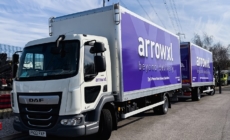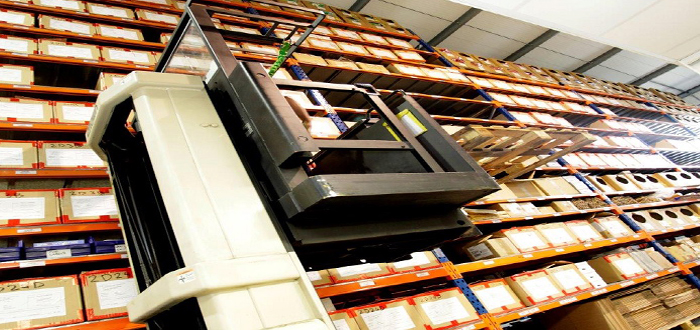-
ROSSLARE EUROPORT TARGETS HEALTH & SAFETY WITH CAMERA TELEMATICS PARTNERSHIP - 2 days ago
-
Landmark Study Reveals Wearable Robotics Significantly Boost Safety and Efficiency in Industrial Environments - July 24, 2024
-
Visku Tackle The Retail Seasonality Challenge One Pallet At A Time - July 22, 2024
-
KAMMAC AND BERGEN LOGISTICS STRENGTHEN FASHION & LIFESTYLE SERVICES IN THE UK - July 19, 2024
-
TENTBOX EXTENDS PARTNERSHIP WITH ARROWXL TO SUPPORT INCREASING DEMAND - July 17, 2024
-
The Perfume Shop improves customer journeys while driving profitability in partnership with Scurri - July 17, 2024
-
ZEROMISSION SECURES £2.3M ($3M) INVESTMENT TO ACCELERATE ELECTRIC FLEETS - July 16, 2024
-
BCMPA CELEBRATES SUCCESS OF 2024 CONFERENCE - July 15, 2024
-
Best of the Best: Jungheinrich Celebrates Triple International Award Win - July 12, 2024
-
GOPLASTICPALLETS.COM CALLS ON NEW CHANCELLOR RACHEL REEVES TO CONSIDER PLASTIC PACKAGING TAX REFORM - July 10, 2024
Appointing the right supply chain partner provider has never been more important, says William Walker.
Follow the Government’s advice – use a logistics specialist
Following the Government’s advice this summer that companies should consider engaging the services of logistics specialists to help them to prepare for post-Brexit trading conditions, at Walker Logistics we have experienced a noticeable upturn in enquiries from a broad range of businesses operating in diverse industry sectors.
More and more companies, it seems, are hoping to realise the benefits of sub-contracting supply chain activities to experts and, given the current uncertainties facing the business community, appointing the right supply chain partner provider has never been more important.
But, with the number of companies offering, or at least claiming to offer, a comprehensive range of logistics services on the increase, picking the third party logistics (3PL) specialist that is the best ‘fit’ for your business’s needs now and in the future can be a daunting prospect.
And, how can you be sure that your chosen 3PL is able to adapt to meet the requirements of post-Brexit trade? After all, the EU referendum result is going to have serious ramifications for all UK companies that import and export goods and warehousing and transport operations will have to change dramatically as a result.
Whether you are outsourcing for the first time or looking for an alternative supplier of logistics services to the company that you already use, there are many things to consider.
For example:
• Does the 3PL company have a proven track record?
• Is the 3PL’s geographic location right for you?
• Will the 3PL offer a scalable service capable of growing with your business’s needs?
• Does it offer the range of services – warehousing, packaging, transportation and distribution – you are looking for?
• Does it have the necessary structure and know-how within its organisations to get the job done?
• Does the company have a commitment to continuous improvement?
• Is the company capable of the meticulous fine tuning required to integrate and take over your logistics function?
• Does the 3PL possess the personnel and financial resources necessary to fully integrate you’re your organisation?
Then, of course, there’s the financial aspect. Budgetary considerations should never be the overriding concern when vetting 3PLs, but the pricing structure of any outsourced logistics agreement is clearly an important consideration.
Your prospective 3PL partner should be able to offer advice and guidance on the type of charging mechanism that best suits your company’s needs and you should avoid operators that appear to be attempting to shoehorn you into a certain type of fee structure.
Consider too, that it is always essential to have a well thought out contract and scope of work. These documents should clearly define the tasks involved for both organisations, including a concise statement of the nature of the operation, which tasks are to be performed and the level of service to be achieved.
This is vital as close collaboration between a 3PL and its client is one of the cornerstones of any successful contract, so pick a partner that has the motivation for developing a ‘tight-knit’ partnership.
And, finally, how do you optimise your chances of finding a 3PL partner that is ready for Brexit – whatever form it may take?
It’s something that, of course, is made all the harder by the uncertainty still surrounding the issue, but I would suggest it would be useful to identify a 3PL with experience of shipping goods outside the EU. Such companies are likely to have the necessary systems and infrastructure in place and be familiar with the kind of paperwork and customs procedures that could become necessary when shipping from the UK to mainland in Europe and vice versa.
At Walker, for example, we have taken steps to expand our administration support team so that any increase in beaurocracy that may follow Brexit does not impact on our clients’ despatch and delivery speeds.
We have also entered into a number of strategic partnerships with continental 3PLs. By integrating with their systems we are able to hold and despatch stock from these locations if necessary.
By ensuring that 3PLs possess the key capabilities outlined above, prospective users of third party logistics service companies can ensure that their business’s performance will be greatly enhanced – regardless of the challenges that the post-Brexit business landscape brings.

































